Surely, You Jest
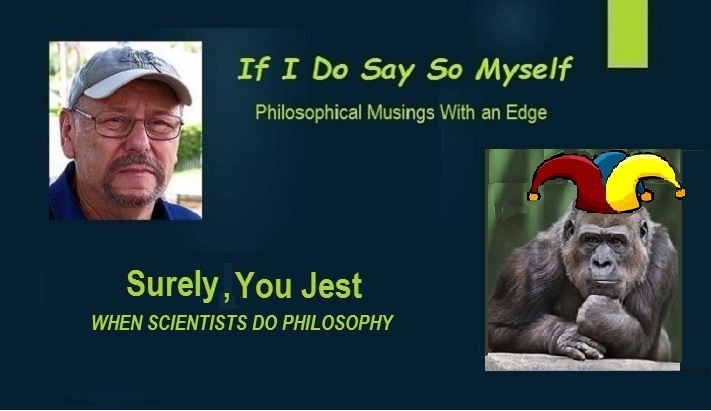
WHEN SCIENTISTS DO PHILOSOPHY...
Preface: Be warned. This piece borders on being a typical academic rant, and deals with a somewhat esoteric subject. But that does not mean it is obscure. For it is not. I believe strongly that it can be followed by any moderately intelligent and reasonably literate reader. And so, I hope that you will stay with me, despite this caution, which I feel obliged to voice.
A recent post by my scientist friend, Milos Djukic, shared without comment an article by Dr. Brian Kurilla, Ph.D., in American Scientist, titled "The Evolution of the 21st Century Scientist".
The article is primarily about what the author, Dr. Kurilla, sees as a contemporary migration of scientists from the environs of academic research to the less rarified world of business and commerce. And he claims that fewer than 45% of academically trained scientists now actually work in the Land of the Ivory Towers. Which claim I am fully prepared to accept. However, he also says that,
"Science is about far more than the accumulation of facts. It’s about the process we use to acquire knowledge. Facts can change over time with subsequent research and discovery, but what doesn't change over time is the method and approach used by scientists to study the natural world."
Brian Kurilla, Ph.D. in American Scientist
And then, goes on to assert by implication, if not by outright postulation that scientists and the "scientific method" are superior respectively to the rest of the planet's population and their methods for understanding the world.
To my mind, all still within the bounds of a primarily reasonable outlook.
Then, not to be satisfied, Dr. Kurilla crosses a line in the sand that has been drawn and defended by just about every 20th and 21st century philosopher of repute, when he says that,
"Science is about far more than the accumulation of facts. It’s about the process we use to acquire knowledge. Facts can change over time with subsequent research and discovery, but what doesn't change over time is the method and approach used by scientists to study the natural world."
Brian Kurilla, Ph.D. in American Scientist
Facts can change over time? Really?
Research and discovery establish truth in the natural world using the scientific method? Really?
Surely you jest, Dr. Kurilla.
Let us be very clear, the thesis you're advancing is that the only unchanging reality is the way scientists approach and seek to understand the physical world — commonly called using the "scientific method".
Well, pardon me. But as a philosopher, I object to these baldfaced claims and pronouncements. For in my opinion, they smack of a logically unsustainable and wrong-headed relativism.
Even leaving aside that the scientific method and approach used by scientists to study the natural world has itself mutated over the centuries, we need simply ask ourselves,
What sense is there in pursuing science at all, if that which science seeks to study and understand is constantly and forever in flux?
Need I point out the only possible answer to this question? Hardly.
For, Dr. Kurilla, it seems to me that your underlying thesis is its own reductio ad absurdum. Contrary to your statements, facts are objective realities. They do not change willy nilly.
True, our perception of the facts and what they are, may change. And at any given point in time, our perception of what the facts are may be more or less in alignment with a reality that ironically we may never know, or be able to know completely. But that does not mean that the facts or reality change, or that they are relative.
Further, let us be clear about this, as well: Nothing in this view — which is held by the vast majority of philosophers of science — is inconsistent with the generally accepted contemporary vision of science and the "scientific method".
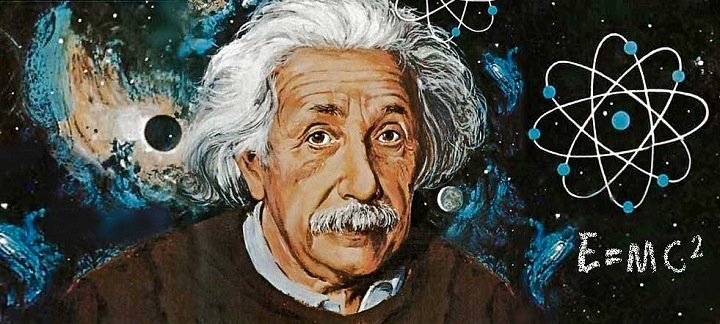
No doubt, some will rally to your position, pointing out with self-assurance that since Einstein we've known that "everything is relative." Truth, facts, and reality. My truth is different from your truth. The facts today different from the facts some years from now. And the reality I recognize different from yours. Poppycock!
First, Einstein did not in his special and general theories of relativity seek to prove, as is so often asserted, that everything is relative. Rather he sought to establish ways of seeing the events of the space-time continuum independent of the distortions to our perceptions created by our relative position (or velocity) in observing them.
Consider, if you will, looking at this moment up into the night sky and seeing all the millions or billions of stars in the universe. You can observe their positions and apparent movement, and as a result, you can form a picture of what the universe is like at this moment. Unfortunately, that picture would be wrong.
Because it takes so long for light to reach us from so far away, almost none of those stars are in the position we "see" them as being in, for they have moved by the time we observe them, or we have, or both. So the reality of the universe is not what we observe it to be at this moment, that is, not what we perceive it to be.
However, it does not follow logically from this that reality is relative. For reality is what it is, whilst our perception of it is both relative to our position in the time-space continuum, and is changing all the time ahead of our perception.
Granted, science has come a long way since Einstein introduced his theories... It has come all the way to contemporary String Theory. But the key is to understand that theories are just that, theories.
Theories are explanations constructed on the basis of observed phenomena, created to "explain" (or model) a reality that is not directly observable. Theories may be more or less accepted by scientists and lay persons, and more or less well confirmed by predictive and retrodictive testing. But theories remain theories, and are not to be identified with the "reality" they seek to describe and explain.
When some theories become very well accepted by the relevant scientific community, they often come as well to be considered fact. But they are never fact, precisely because ultimately they deal with phenomena not directly observable. Consequently, it is a mistake to think that, because many theories evolve and change over time, that fact is mutable.
For again, if fact were mutable, there would be no point to the search for scientific knowledge.
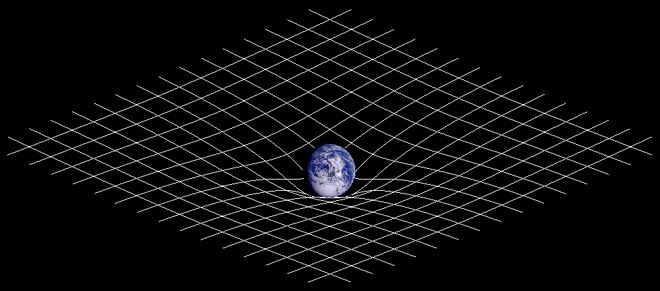
And while we're on that particular topic, I should also like to take exception to the oft-expressed view, and the view implied, if not explicitly stated by Dr. Kurilla's thesis, that scientific theories are the only reality in the physical world.
Theories do not create reality — however much they may structure our conception and perception of it.
Now, you might ask where Dr. Kurilla comes up with his thesis of the scientist, through his practice of the "scientific method", as the creator of reality. Here's what I think.
But first, kindly understand that, while the following rumination is about scientific personalities, it is not an ad hominen argument or attack upon scientists in general, or upon Dr. Kurill in particular. Rather it is the expression of my personal observations, conducted over many years, both inside and outside of academic circles.
When social scientists view the work of physical scientists, the social scientists, as a group, tend to experience what I call "fact envy"...
![A
PH siogoets]
Em LEE] 2 huencer](https://contents.bebee.com/users/id/10277593/article/surely-you-jest/280b8097.jpg)
Yes Virginia, I do tend to think it is a matter of "my facts are bigger than yours"... or perhaps more accurately, your facts are bigger than mine.
But whichever it is, it has for a long time seemed to me that social scientists want to focus more on the "substantial and durable" nature of the process of science, rather than on the object(s) of scientific inquiry. And I am inclined to conclude that is because social scientists deal with things like the mind, personality, attitudes, social behavior, and the like — all of which, as objects of scientific inquiry, are less "corporeal" than the object(s) of physical science.
If you doubt that, consider how many social scientists actually get "the shakes" every time a neuropsychologist writes a paper that seeks to reduce "mind" and "consciousness" to a cluster of brain matter exhibiting dynamic electrochemical reactions.
I suspect that one reason for their reaction is that some social scientists confuse "relative" with "subjective." I think, for instance, our view of "the mind" is relative to our point of view as an observer. But it is not subjective in the way that we might say beauty is. Or goodness. Or honor.
However, be that as it may, there is no basis for blurring the division between the process of scientific inquiry and the object(s) of such inquiry.
There is little to be gained here in replicating the point over and over again. Simply ask yourself whether, if that which Dr.Kurill postulates were true, would there be any point to, say, the pursuit of engineering science.
What good would it do to develop an entire science of strength of materials — including vast tables of mechanical properties of various and sundry materials, used in designing and engineering structures like skyscrapers and bridges — if the established mechanical properties of those materials could at any time change radically and unpredictably on their own?
No, my friends, if the pursuit of scientific inquiry is meaningful, then there must be a physical reality beyond the process that seeks to discover and understand it. That reality may not be what even our best or mostly confirmed theories of today postulate that it is, but that it exists underpins all of science itself. — Phil Friedman
Postscript: I am more than happy to "philosophize" about this issue with anyone who wishes to do so. However, please do not regale me with religious objections and arguments. This issue is actually completely independent of questions like whether there is a god (or gods), why there is evil in the world, and even whether the theory of evolution is correct or not.
As well, do not upbraid me for taking Dr. Kurilla to task, for I have neither said, nor done nothing here that is not commonly said and done in any healthy academic environment, where there is free and active intellectual exchange. Moreover, I have sent a link to this post to Dr. Kurilla c/o American Scientist, so that if he so chooses, he may respond either here or in a venue of his choice.
Finally, if you were tenacious enough to make the effort and take the time to follow these remarks all the way to this point, I sincerely thank you for reading and look forward to engaging you further in conversation about this philosophical issue, should you so desire. — PLF
Author's Note: This post represents an unusual return to a kind of philosophy which I gave up doing years ago, but which I have been moved of late to partake in again. If you found this interesting and worthwhile, and would like to receive notifications of my writings on a regular basis, click the [FOLLOW] button on my beBee profile. As a writer-friend of mine says, you can always change your mind later.
As well, feel free to "like" and "share" this post and my other articles — whether on beBee, LinkedIn, Twitter, Facebook, or Google+, provided only that you credit me properly as the author, and include a live link to my original post.
About me, Phil Friedman: With 30 some years background in the marine industry, I've worn numerous hats — as a yacht designer, boat builder, marine operations and business manager, marine industry consultant, marine marketing and communications specialist, yachting magazine writer and editor, yacht surveyor, and marine industry educator. I am also trained and experienced in interest-based negotiation and mediation.
In a previous life, I was formally trained as an academic philosopher and logician, and taught logic and philosophy at university.
The (optional-to-read) pitch: As a professional writer, editor, university educator, and speaker, with more than 1,000 print and digital publications, I've recently launched an online program for enhancing your expository writing: learn2engage — With Confidence. My mission is to help writers and would-be writers improve the their thought and writing, master the logic of discussion, and strengthen their ability to deal with disagreement.
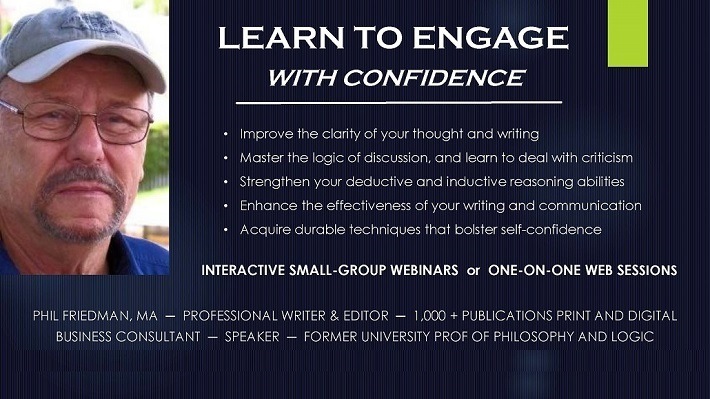
To schedule an appointment for a free 1/2-hour consult email: info@learn2engage.org. I look forward to speaking with you soon.


Articles from Phil Friedman
View blog
RUNNING ON RAILS DOESN'T GET YOU ANYWHERE, WHEN THE TRACK DEADENDS... · If you are tired of having y ...
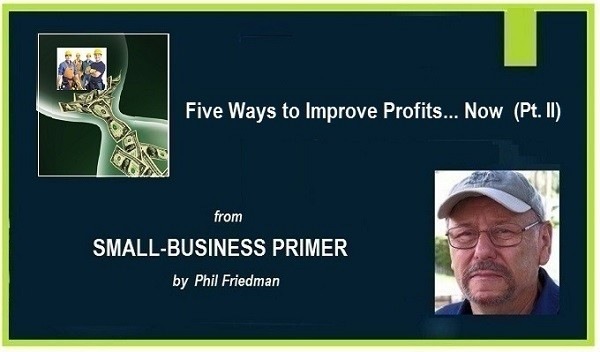
IMPROVE CAPTURE OF BILLABLE HOURS TO BOOST GROSS PROFIT WITHOUT ADDED OVERHEADS... · Preface: · This ...

THIS SERIES OF LITERARY SELF-INDULGENCES IS DUBBED "THE ROAD CHRONICLES" BECAUSE THEY USE BEING ON A ...
Related professionals
You may be interested in these jobs
-
Residential Construction Service Manager
Found in: Talent US C2 - 1 day ago
M/I Homes, Inc. Indianapolis, United States Full timeM/I Homes has been building new homes of outstanding quality and superior design for more than 40 years. Founded in 1976 by Irving and Melvin Schottenstein and guided by Irving's drive to always "treat the customer right," we have fulfilled the dreams of over 140,000 homeowners a ...
-
Quality Improvement Analyst III
Found in: One Red Cent US C2 - 2 days ago
CareOregon Portland, United States· Career Opportunities: Quality Improvement Analyst III · Requisition ID 24115 - Posted 03/29/2024 - CareOregon - Full Time - Permanent - Portland - Multi Location (16) · Job Description Print Preview · Apply · Save Job · Email Job to Friend · Return to List · Candidates hired ...
-

Director of Occupational Safety
Found in: Jooble US O C2 - 6 days ago
Board of Certified Safety Professionals Boston, MA, United StatesAt the MBTA, we envision a thriving region enabled by a best-in-class transit system. Our mission is to serve the public by providing safe, reliable, and accessible transportation. MBTA's core values are built around safety, service, equity, and sustainability and each employee t ...



Comments
Phil Friedman
6 years ago #80
Robert Cormack, I understand what you're saying and, in the main, agree. However, my academic background in philosophy drives me to be overly meticulous about expressing the difference between "the facts" and "our perception of understanding of the facts". You say, "...facts can change the more we understand facts...", but I would say that what changes is not the facts themselves, but the set of what is generally accepted as "the facts". Picayune? Perhaps. But a distinction that I believe is essential, if we are to get away from the misbegotten concept that what is factual is completely relative. (And please, those of you out there who will now be moved to refer to Einstein's Theory of Relativity, be sure that you first understand the core thesis he advanced.) Thanks, Robert, for reading and commenting. Cheers!
Robert Cormack
6 years ago #79
Randy Keho
7 years ago #78
The language may have been a bit more colorful. Phil Friedman. And, the event would been followed by a Chianti and Ragu dinner.
Milos Djukic
7 years ago #77
I tend to agree with you Phil Friedman, as many times before. Critical discussions and studies are not too popular in social media and networks, but as you know for me they are a great source of knowledge. Luckily, I am not the only one. You have the right to criticize. Disagreement is also our willingness to accept further challenges and any other scientific claims that are against common sense. What everyone feels like pleasure is the flat earth without roughess. Our brain is not a flat plate, it is primarily an enigmatic fact for us. Best Regards, Mlos
Phil Friedman
7 years ago #76
Thanks, John White, MBA, that Dr. Kurilla (the main foil for my post) could follow the link I sent to him at both Amercian Scientist and at his personal blog page, read my post, and decide if it were worth his while to spend a few minutes to sign up and answer. I think that takes care of academic and literary integrity, don't you? Cheers!
Milos Djukic
7 years ago #75
Great info John White, MBA. Seems fair to me. Thank you.
John White, MBA
7 years ago #74
Milos Djukic: People that are not yet beBee members can read articles on Producer. However, in order to mark it relevant or comment they must sign up.
Milos Djukic
7 years ago #73
Jim Murray, Yes I am an arrogant fractal troll :) Any further comments/compliments/complaints?
Milos Djukic
7 years ago #72
Jim Jim Murray, Yes I an arrogant fractal troll :) Any further comments/compliments/complaints?
Phil Friedman
7 years ago #71
@Charles David Upchurch - As we used to say in Chicago, if the cement shoes fit, wear them. :-) (Didn't we say that, Randy Randy Keho?)
Jim Murray
7 years ago #70
Jim Murray
7 years ago #69
Phil Friedman
7 years ago #68
For the record, Charles David Upchurch, I made the typographical corrections that you brought to my attention. Thank you for bringing those to my attention. BTW, the quote from Dr. Kurilla's article was duplicated intentionally, so you can rest easy on that one. Cheers!
Milos Djukic
7 years ago #67
I am very interested about his interpretations.
Milos Djukic
7 years ago #66
Yes, I agree with you Phil Friedman any thoughts?
Phil Friedman
7 years ago #65
Well, Milos Djukic
Milos Djukic
7 years ago #64
Phil Friedman
Milos Djukic
7 years ago #63
Phil Friedman
7 years ago #62
Milos Djukic, further to your wholly justifiable concern, I also went to the posting of Dr. Kurilla's article on his personal blog, and posted a link to my piece in the comments thread there. I did not post the text of my post. It is now up to Dr. Kurilla whether he chooses to respond here or not. Thank you for keeping us all intellectually and academically honest. Cheers!
Milos Djukic
7 years ago #61
Phil Friedman, Very good. Thank you.
Milos Djukic
7 years ago #60
Phil Friedman
7 years ago #59
It is also important, Milos Djukic, to note, as I mentioned in my Afterword, that I sent a link to this post to Dr. Kurilla in care of American Scientist, so that he would be made aware of it. Thank you for making the point about how important it is to give someone the opportunity to respond when one publishes an article critical of something that person has published.
Milos Djukic
7 years ago #58
Phil Friedman
7 years ago #57
Phil Friedman
7 years ago #56
@Charles David Upchurch - David, I find your introductory paragraph here unfairly accusatory, presumptuous, and inappropriate. I will, however, answer it candidly. Stop whining. I am not obligated to follow anyone. And if I choose not to follow you, that is my prerogative, and it is out of order for you to make a public issue of it, as though I have done you some wrong or harm. Perhaps, the very fact that you choose to make this complaint publicly, and in the process to take a slanderous swipe at Jim Murray, provides some itty bitty clue as to why I do not follow you. If not, let me explain further that I don't follow you precisely because you have on several occasions engaged in discussions about me with my pet troll of several years ago, who daily crept my profile on LinkedIn for years and continues to do so here on beBee. And while I understand that your intent in doing so was without malice, in every case you misrepresented my actions online and views, which misrepresentations only muddied the water and encouraged said troll to continue in his maligning and malignant activities. You know full well that I contacted you privately and explained this all to you. cont Pt II ...
Phil Friedman
7 years ago #55
- Pt II - Charles David Upchurch You also know full well that I have never failed or refused to answer any comment directed to me by you on any of my posts. Nor have I failed, to the best of my knowledge and ability, to answer your comments made to me in the threads on the posts of others. Nor have I ever denigrated or upbraided you. So what really is your beef? Now, as to your criticism of my piece, I don't give a damn about any typo or mis-spelling I may have made concerning Dr. Kurilla's name. I included a live link directly to his article, so that there would be no question either about who he was, or what he wrote. As to your support for his position, the entire point of my argument is that a distinction needs to be drawn between what is accepted as fact (body of accepted knowledge at a point in time) and the true facts, i.e., the underlying reality. And my argument proceeds proceeds by way of a reductio ad absurdum, to the point that if there is not an underlying immutable reality (which may or may not be completely knowable by us), there is no point to doing science. For to believe that all is mutable is to make scientific investigation pointless. Thank you for reading and commenting.
Phil Friedman
7 years ago #54
Thank you, Mark Anthony. Due to other work in my core business, I've been slower than anticipated in the full launch of my http://www.learn2engage.org effort, but I hope to have it fully up and running, with the small group sessions on Citrix Go To Meeting, by the end of September. As you know, my mission is to help writers, would-be writers, and other interested parties to improve the organization of their thinking and analysis, and to learn to engage with confidence. One of the programs I'm currently organizing provides for a free introductory session. Interested parties are invited to email me at: info@learn2engage.org. Cheers!
Mark Blevins
7 years ago #53
Phil Friedman
7 years ago #52
Thank you, @Mark Anthony, for the kind words. They are especially gratifying to hear, because a few people have sometimes taken my propensity to question and disagree as qualifying me for Trollship. :=)
Phil Friedman
7 years ago #51
Randy Keho, I guess you might say, surely, I jest. :-)
Randy Keho
7 years ago #50
I was rather impressed by Phil Friedman
Kevin Pashuk
7 years ago #49
I am so stealing that line Phil Friedman.
Milos Djukic
7 years ago #48
:) True
don kerr
7 years ago #47
Did you really just do that Phil Friedman
Randy Keho
7 years ago #46
Yeah, followed by "Shots fired."
Phil Friedman
7 years ago #45
P.S. Randy Keho - anyway, in Chicago, isn't the saying "I tink derefore I lam.."? Or something like dat?
Phil Friedman
7 years ago #44
Yes, it does, Randy Keho, but doing so may be putting Descartes before da horse. Thank you for reading and commenting.
Randy Keho
7 years ago #43
Phil Friedman
7 years ago #42
Gerald Hecht - yes, I think it demonstrates that sometimes we can create genuine conversation on beBee, not just comment threads in which people simply talk AT each other. i am surprised and delighted that we haven't heard from the disagreement police about the fact that some of us have attempted to carry on an exchange at a substantive level. Refreshing isn't it. And the thread has exceeded my expectations when I wrote the piece.
Phil Friedman
7 years ago #41
Actually Mark Anthony - The planet earth is not round, but is a mis-shapen "oblate spherioid" -- supposedly. Personally I have no confirmation of that, but am taking the astronauts' words for that. Cheers!
Phil Friedman
7 years ago #40
Phillip Hubbell - Obviously, I do not pretend to speak for Popper, but my guess is that he was demonstrating one of his central theses, which is that science is not just the collection of observation and empirical data. That science proceeds by disproving theories. And that what we "know" is the way things aren't. Of course, that could be proven wrong.
Milos Djukic
7 years ago #39
Sorry Gerald Hecht!
Milos Djukic
7 years ago #38
Absolutely Gerald Hecht. And with an insufficient number of participants.
Phil Friedman
7 years ago #37
Thank you, Mark Anthony, for reading and commenting. Obviously, I agree with you, for if facts change then I don't see any purpose in doing science. If everything changes, including what we have historically called the "laws of the universe", then why expend so much energy in trying to discover and describe those laws? Let all just go for a beer instead. Cheers!
Phil Friedman
7 years ago #36
David Grinberg - thank you, as always, for reading and commenting. You make several interesting points. Here's the thing about aging the universe: Even if we can measure the rate at which the universe is expanding, and work back to when that expansion began, all else aside, we would still have to assume that it has been expanding at a constant rate or at a constant rate of increase in rate of expansion. Without that assumption, and it is an assumption, dating the age of the universe in this way isn't worth dog doo. Not to put too fine a point on it. So, I agree with your point that theories become more or less accepted, and more or less confirmed, but in my lexicon never become fact. Even if a given theory were to be fully correct, that would make it fully correct, not fact. For fact is what the theory seeks to demonstrate, not the theory itself. By the way, speaking of Copernicus, if the universe lacks a single fixed point, then Copernicus has been badly maligned by Heliocentrists. For the selection of of a point about which all else rotates seems arbitrary. And although a heliocentric point of view might make explaining the apparent motion of the heavens easier, it does not follow from that it is "true". (Just funin' wid ya, David.)
Milos Djukic
7 years ago #35
Milos Djukic
7 years ago #34
milos@fractaltrol.com :)
Milos Djukic
7 years ago #33
I am sure that You will understand everything!
David B. Grinberg
7 years ago #32
Milos Djukic
7 years ago #31
David Grinberg, my friend :)
Phil Friedman
7 years ago #30
Sure, it's phil@gotyoudidinot.com. Just kidding, will send to you via private message. Best personal regards.
David B. Grinberg
7 years ago #29
Milos Djukic
7 years ago #28
Phil Friedman, Please send me your private mail.
Milos Djukic
7 years ago #27
Phil Friedman, Please send me mail your private mail.
Milos Djukic
7 years ago #26
Phil Friedman, "Immutable Underlying reality" will be a key topic of future theory of everything with a multiple dimensions and with traces of fractals (chaos). Until then, Fractals are forever :)
Phil Friedman
7 years ago #25
Thank you, Milos Djukic, please do. Not saying, however, that I will understand it. However, I again need to point out that a lot is revealed in your choice of the word "paradox" -- which catches my eye because my specialty was in the day known as "ordinary language philosophy". Your use of the term indicates a bipolar (or possibly multi-polar) relationship between accepted "facts", not the replacement of one by the other. This is evidence of judgement being relative to one's adopted POV and/or the level at which one is working. You know, I think about the nutritional scientists who several decades ago told us all to desist from eating butter, but to eat instead oleomargarine. Because butter was bad for our cholesterol levels and so made us more prone to heart disease. Then after several decades of us eating margarine, nutritional science changed its collective mind, and said, no margarine is no good for you, as it actually increases the level of "bad" cholesterol in your blood, so go thee forth and eat butter instead. The margarine and the butter did not change. What changed was the level of understanding that nutritional science had of the cholesterol-producing mechanism in the body. Scientists don't like to be cross-examined over these changes, but it would be interesting to hear their response to a question drawn from courtroom cross-examination: If you asserted A then, but now assert B, does that mean you were wrong about A then... and if so, what is to say you are not wrong about B now? If there is no immutable underlying reality to discover and study, then what is the point of doing science?
Milos Djukic
7 years ago #24
Milos Djukic
7 years ago #23
Yes great conversation Phil Friedman and sound reson for my previous cc. Thank you!
Milos Djukic
7 years ago #22
Phil Friedman
7 years ago #21
Of course, Gerald Hecht, it comes down to what constitutes intelligence. I personally tend not to identify intelligence with consciousness, and believe that there may be some form of intelligence operating in nature that is not conscious. Watch how some plants send out runners then create new replications of themselves as the ends of those runners, in a fascinating emulation of mobility. The plant may be "seeking" more nutritional soil, or water, or perhaps even to peek into Miss Bee Haven's dressing room window; we just don't know. But whatever is driving the observable behavior, it does not appear to be random. The theory of Natural Selection is based upon the assumption of completely random mutations, some of which accidentally coincide with survival value in, again, a randomly developed environment. All of which is a pretty workable theory, except for the amount of time a completely random system might take to generate the evolution for which we have clear evidence. Please understand that I am not talking about "the man in the machine", but only about some form of "muscle learning", i.e., organic adaptation that may be nothing more conscious than the natural manifestation of a built-in algorithm. Great conversation here, don't you think?
Milos Djukic
7 years ago #20
Phil Friedman
7 years ago #19
Milos Djukic - The key to my mind is when you say, "...both are true at different scales", with the operative expression being "at different scales." What is different (or changed) between the two "facts" is the point of view of the researcher/observer, not the "facts" themselves. And this follows from your own observation to the effect that the "new" fact did not invalidate the "old" fact, but that the two remain both true, despite their APPARENT disagreement, if we disregard the difference between the two contexts in which each is respectively asserted as fact. Again, to quote your own words, "There is a TIME AND SPATIAL GAP that presents a problem in INTERPRETING THE RESULTS about microscale behavior, obtained from the atomic, nano-, and micro-models and simulations, and their correlation with macro-mechanical behavior of materials resulting from effects of hydrogen embrittlement." [emphasis mine]. The mutation involved over time and across the varying levels of examination (varying theoretical and conceptual frameworks) is not in the physical reality -- which I identify as factual reality -- but in what is ACCEPTED AS FACT, which is a matter of (transient) judgement, and not the same as the underlying reality. I repeat my assertion that if there is no durable, immutable underlying reality (which admittedly we may never, or be able to know completely), then science is reduced to a temporary and incomplete heuristic, that we employ to achieve acceptable results in our manipulations of the macro world. Similar to the difference between the hydrogen embrittlement research and science that you pursue, and the "cookbook" engineering of bridges and other structures. Thank you for reading and taking the time to comment in detail. I am flattered that you think my article worthy of your crafting such an erudite reply. Cheers!
Milos Djukic
7 years ago #18
Milos Djukic
7 years ago #17
Phil Friedman
7 years ago #16
Gerald Hecht - well, that was Karl Poppers overview of science. Although others feel differently. Wouldn't you say?
Phil Friedman
7 years ago #15
Gerald Hecht, that is why I specifically warned anti-evolutionists not to write to me about the Devil's scientists. I personally see theories for what they are, namely, theories. But not being absolutely certain about the validity of a theory, does not mean the theory is false. Some theories are stronger and more credible than others. The theory of evolution is very strong, for example. It should, however, be distinguished from the theory of natural selection, which is a supporting ancillary to the theory of evolution. The theory of natural selection is not as strong, NOT because it doesn't account in large measure for evolution of species, but because there is some question as to the length of time that would be required to see the changes in species that have been documented. So one might ask whether there isn't come "intelligent" force at work helping natural selection along. I have some sympathy for that because I once looked down on my right hand, in which I had been carrying a ugly embedded splinter. The hand was infected. And I was washing dishes, when quite suddenly the flesh seemed to pulsate, and the cells literally seemed to be working to expel the embedded splinter. I watched in amazement as the splinter was pushed out from under the skin a sufficient distance to enable it to be grasped with a forceps and removed. Do cells themselves have some form of intelligence? We know they attack foreign proteins. None of which, is an invitation for any religionists to post comments here.
Phil Friedman
7 years ago #14
Gerald Hecht a "grow up" from which "ex"? Your former domestic partner, or your old Marine drill Sargent? My "ex" is also a philosopher, which I guess is why we never agreed on anything. My non-ex is the love of my life -- although she has a wickedly sarcastic sense of humor. None of which is to any point.
Phil Friedman
7 years ago #13
Thank you Don Kerr, for taking the time to read and share a bit of pithy wisdom. Silence often speaks volumes -- about the speaker's positivevinsight. (Chung King, ca 650 AD)
Phil Friedman
7 years ago #12
@Gordon Pyle - Your suspicions coincide, sir, with mine. Or vice versa, depending on relative POV. In the words of Chung King (ca 650 AD), "Mistake not obscurity for depth of thought..." Thank you and cheers!
don kerr
7 years ago #11
Kevin Pashuk
7 years ago #10
Phil Friedman
7 years ago #9
And leaving, Gerald Hecht, the room of scientists to ponder at the meta level the value of their "empirical" observations. But to what point? Perhaps, only the dramatic. A psychologist once told me that philsophers of science have the biggest egos he'd ever seen -- which years later, in retrospect, seemed to me to be saying that they were a bunch of d#@kheads. Who says academics are colorless?
Phil Friedman
7 years ago #8
Gerald Hecht - science may have evolved from philosophy, but although bed fellows (excluding the Germanic Metaphysicians), scientists rarely make good philsophers. Mathematicians appear to be better at philosophy, including philosophy of science. Witness Bertrand Russell. For the most part, scientists are do-ers and best at doing. Cheers!
Phil Friedman
7 years ago #7
Thank you @Nicholas Fester, for reading and commenting. Cheers!
Phil Friedman
7 years ago #6
Gerald Hecht, is that "Stop calling me 'Shirley'"? Or is that "Stop calling me, Shirley"? Shirley, you jest.
Phil Friedman
7 years ago #5
Praveen Raj Gullepalli - Agreed in the main. Thank you for reading and commenting. Some scientists should stick to science. Cheers!
Phil Friedman
7 years ago #4
@prabhakara rao rajarapu - Is there some reason, you keep tagging Margaret Aranda on my posts? Is it because you want her to see my writings, or because you want me and my followers to see her name and profile?
Phil Friedman
7 years ago #3
Milos Djukic - me too, my friend. Late here and time to rest.
Milos Djukic
7 years ago #2
Challenging I am tired now Phil Friedman, but I'll be back...
Phil Friedman
7 years ago #1